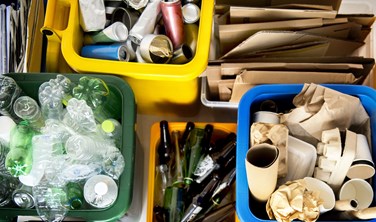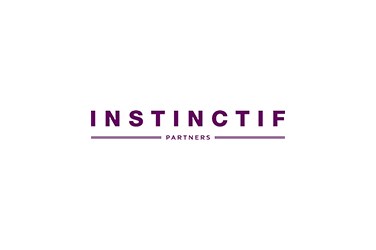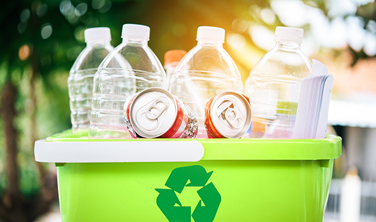The industry uses plastics and other packaging materials primarily to protect products across the supply chain and ensure they reach the consumer in a safe and optimal condition; packaging therefore also plays an important role in preventing food waste and contributing to the sustainability of the whole supply chain.
Alongside our value chain partners FDF is committed to working with the UK and Devolved Nation Governments on the implementation of the packaging reforms - Extended Producer Responsibility (EPR), Deposit Return Scheme (DRS) and Collection Consistency- to ensure these deliver greater circularity for packaging, including through the creation of a world-class recycling system.
The FDF is a founding signatory of the UK Plastics Pact, bringing together the entire plastics value chain under one ambitious set of targets. We are working with WRAP on developing a successor agreement to the Pact beyond 2025.
Updates & milestones
Recyclability assessment methodology published for 1st Jan
From 1 January 2025, liable producers who supply household packaging must assess the recyclability of that packaging and report the results of the assessment to the environmental regulator. Different kinds of packaging receive different ratings - red, amber or green. This rating affects the disposal fee that will be charged for that packaging. This is sometimes called ‘fee modulation’.
The RAM will be reviewed and updated where appropriate once a year, in line with reporting periods for EPR for packaging. This is to allow for innovation, evolving market conditions and regulatory changes.
Updated Illustrative Base Fees for EPR
DEFRA has published the updated illustrative base fees for EPR materials. The FDF has been asking for the publication of a single figure before the year end for business planning purposes. It also confirms that the final year 1 fees are planned to be published by July 2025, providing regulatory checks. These fees will apply for year 1, with modulated fees introduced from year 2.
Consultation on rules for consistent recycling collections from households and businesses in Northern Ireland
In a similar vein to Simpler Recycling in England, the Northern Ireland Executive is currently consulting on proposals to increase the quality and quantity of materials captured for recycling by requiring councils to collect a core set of dry recyclable materials from households within two years of notification of a statutory requirement. It is also proposed to include in this core set flexible plastic packaging by the end of the financial year 2026/27.
The default collection method will be as four separate streams (glass, paper/card, plastics and metal) with any exceptions such as for co collection requiring evidence that comparable quality is assured. One upfront exception is being considered to allow plastic and metal to be co-collected. The consultation also includes broadly similar proposals for separate collection from businesses and public bodies. The consultation closes on 27 June.
FDF is working with other packaging value chain organisations under the Incpen Trade Association Group umbrella to develop a response to the consultation. The general approach will be to ensure that the approach adopted in Northern Ireland supports a UK wide approach to packaging EPR. Member feedback would also be welcome.
WRAP webinar on the successor agreement to The UK Plastics Pact - 6th February
WRAP is seeking input from wider industry on the proposed ambition and target framework of a successor agreement to The UK Plastics Pact which runs until the end of 2025.
They are hosting a webinar for industry beyond their existing members to talk through the consultation process, their proposed target frameworks and overall ambition for the pact as well as an overview of activity to date.
You can sign up to the webinar here.
Single-use plastics ban in England to commence in Autumn 2023
On 14th January 2023, Secretary of State for Environment, Food and Rural Affairs, Thérèse Coffey, announced that a range of single-use plastics will be banned in England from October 2023.
The ban will include single-use plastic plates, trays, bowls, cutlery, balloon sticks, and certain types of polystyrene cups and food containers. It will also cover items made from plastic that is bio-based, biodegradable or compostable.
Further detail of the policy decisions can be viewed in the consultation response available here.
The ban will not apply to plates, trays, and bowls that are used as packaging in shelf-ready pre-packaged food items, as these will be included under the Extended Producer Responsibility Scheme.
These plans follow from the 2018 ban on microbeads in rinse-off personal care products and 2020 restrictions on the supply of single-use plastic straws, drink stirrers and cotton buds.
The Government is also considering further measures around other commonly littered and problematic plastic items, including wet wipes, tobacco filters and sachets, following the call for evidence on this issue.
Webinars

Webinar
Plastic Packaging Tax – what you need to know
This webinar was presented by Stuart McCallum and Anne Holt, two RSM partners whose sector experience has been built over many years by serving the needs of their food and drink clients.

Webinar
Plastic Packaging Tax Update
This webinar will take an in depth look into the UK wide Plastic Tax and recent updates, with an explanation of proposed timelines and what it means for business.

Webinar
Ensuring Sustainability commitments are authentic, relevant and don’t become a liability
This webinar will guide you through some simple questions to ask yourself when considering corporate commitments to make sure they are authentic, relevant, deliverable and aligned with corporate and brand strategy.
Related pages

Deposit Return Scheme
Deposit return schemes are used across the world as a way of encouraging more people to recycle drinks containers, such as bottles and cans.

Extended Producer Responsibility
Food and drink manufacturers are keen that the implementation of EPR is as successful as it can be and that the risk of disproportionate cost being passed through to consumers is minimised.

Ambition 2030: Packaging
This pillar outlines how we will contribute to the implementation of a world-class packaging recycling.

Environmental Sustainability: Ambition 2030
Ambition 2030 is our flagship strategy for food and drink manufacturing and sets out the sector’s important role in tackling these sustainability challenges and how every business can make its contribution.

Guidance
Industry narrative on packaging and plastics
The Industry Narrative sets forth our position on packaging and plastics: it acknowledges their environmental impact, states their functions and identifies factors in choice of materials and in making changes to the packaging system.

Collection Consistency
Understand the obligations on local authorities as well as business and other non-household municipal premises for collections of recyclable waste for each of the four nations of the UK.
Receive updates on this topic
Want to keep up to date on this topic?
You can receive email updates on this topic by registering for an FDF account.
You can edit your preferences so that you receive updates on the topics and the type of information you are interested in.
Interested in becoming a member?
FDF members have access to a range of benefits to grow, protect and strengthen their business.
Gain an advantage, join FDF today.
